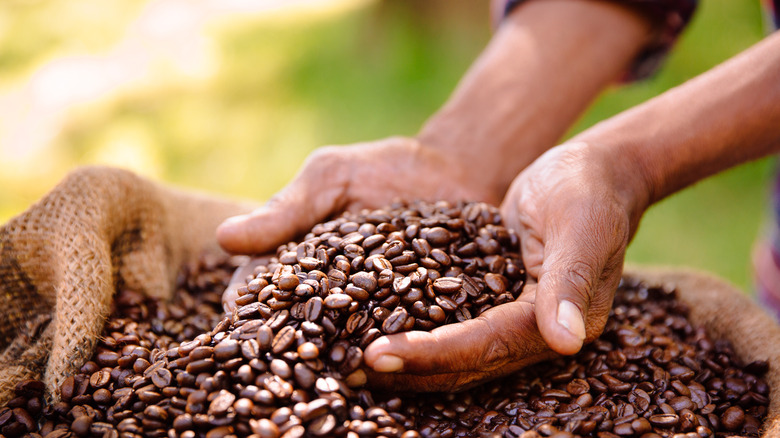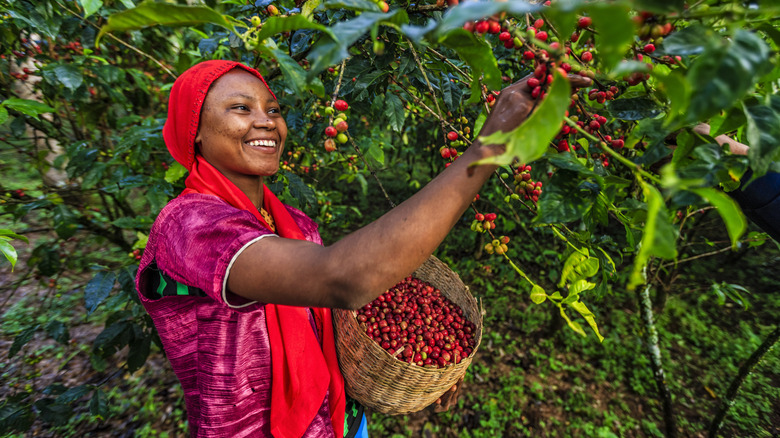What's The Real Difference Between Organic And Regular Coffee?
Reliably stocked on pantry shelves across the world, coffee is one of humanity's most popular drinks. This ubiquitous morning (or — let's face it — afternoon) brew comes in a dazzling complexity of flavors, roasts, and recipes. Whether you're drinking cappuccinos and lattes or classic mochas, you're consuming one of two types of coffee beans: organic and non-organic. Even if you don't consider yourself an Arabica connoisseur or French press aficionado, you've likely still noticed the separation of organic and regular beans on grocery store aisles and coffee shop counters. While these small kernels might look similar, they actually hold quite a few differences.
The distinction between organic and non-organic (regular) coffee comes down to the way the beans are grown. Organic beans are farmed without the use of synthetic fertilizer and genetic modification while regular coffee beans may have been exposed to both. These opposing farming methods require different cultivation techniques, which ultimately result in end products that can differ in everything from taste to price.
Differences in the growing process
To understand the nuanced differences between organic and regular coffee, it's important to first grasp how coffee beans are grown and harvested. In a natural setting, coffee plants grow in partial shade. Most varieties are intolerant of direct sunlight and thrive under a forested canopy that filters the sun. Many — though not all – organic farmers mimic this growth by planting their crops in shaded areas. They rely on the surrounding ecosystem, including birds and lizards, to help manage potential pests, getting rid of the need for pesticides. Generally, this method results in smaller crop yields and requires higher labor costs; however, it is a more sustainable cultivation method.
For the sake of efficiency, regular beans are typically grown in fields of direct sunlight. Farmers will apply chemical fertilizers and pesticides to manage pests without the aid of a biodiverse forest. This is a more streamlined growing method and usually results in higher yields and reduced labor costs when compared to organic farming practices. However, chemical fertilizers deplete the soil of its nutrients, forcing the land to rely on the use of artificial fertilizers for any future growth. In the long run, this is a less sustainable cultivation method.
Can you taste the difference?
The different growing techniques between regular and organic coffee don't only influence the landscape — they also have a direct impact on your morning cup of joe. The most obvious difference? Price. If you buy coffee at the grocery store, you know that organic blends are generally more expensive than regular. This discrepancy primarily reflects the higher labor costs of organic farming.
Beyond price, many coffee aficionados believe there is a stark difference in taste between regular and organic beans. While taste can be a bit subjective, many believe that coffee brewed from organic beans has a smoother taste. Any difference is likely due to the growing techniques. Shade-grown (organic) beans tend to mature slower, which increases the sugar level in the bean. This developmental difference can give organic coffee notes of sweetness that aren't found in regular brew.
Most importantly, organic and regular coffee may have different impacts on your health. A 2019 study published in the journal European Food and Research Technology found that organic coffee beans had more polyphenol compounds compared to regular beans. The study notes that "polyphenols are strong antioxidants" in humans and "protect against many non-infection diseases." In addition to antioxidants, the study found that regular beans contain "significantly more" caffeine than organic. So, if you want an extra buzz in the morning, you might stick with regular!


